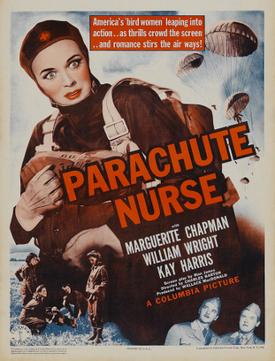Parachute Nurse
Parachute Nurse is a term that refers to a specialized group of nurses who were trained and prepared to be dropped into remote or conflict areas by parachute during wartime, primarily to provide medical care and assistance. This concept was notably utilized during World War II, where such nurses were prepared to offer emergency care, perform medical procedures, and ensure the health and safety of soldiers and civilians in areas that were otherwise inaccessible due to the ongoing conflict or geographical barriers.
History[edit | edit source]
The concept of the Parachute Nurse originated in the early 1940s, amidst the global conflict of World War II. The United States Army recognized the need for rapid medical response teams that could reach isolated or war-torn areas where traditional medical units could not quickly or safely travel. This led to the formation of the Parachute Nurse Corps within the Army Nurse Corps, a pioneering initiative that sought to leverage the mobility offered by parachuting directly into needed areas.
Training[edit | edit source]
Training for Parachute Nurses was rigorous and comprehensive, combining traditional nursing skills with specialized training in survival, parachuting, and combat medicine. Candidates were required to undergo physical fitness training, learn how to handle and pack parachutes, and become proficient in emergency medical care under combat conditions. This training ensured that Parachute Nurses could not only survive behind enemy lines but also provide critical medical support in the absence of a fully equipped medical facility.
Roles and Responsibilities[edit | edit source]
The primary role of a Parachute Nurse was to provide immediate medical care in the aftermath of battles, natural disasters, or within isolated communities. Their responsibilities included triage, emergency surgery, infection control, and the stabilization of patients for evacuation. They worked closely with combat medics and other military personnel, often under challenging and dangerous conditions.
Impact[edit | edit source]
The deployment of Parachute Nurses had a significant impact on military and emergency medicine. Their ability to reach and treat individuals in remote locations demonstrated the importance of mobility and rapid response in medical care, influencing future military and civilian medical services. The bravery and contributions of these nurses have been recognized as an important part of medical and military history, highlighting the critical role of nursing professionals in conflict situations.
Legacy[edit | edit source]
The legacy of Parachute Nurses continues to influence modern nursing and emergency medical services. The concept of rapid deployment medical teams, now often transported by helicopter or fast vehicles rather than parachutes, owes much to the pioneering work of the Parachute Nurse Corps. Their dedication and innovation have paved the way for contemporary approaches to disaster response and remote healthcare delivery.
Translate: - East Asian
中文,
日本,
한국어,
South Asian
हिन्दी,
தமிழ்,
తెలుగు,
Urdu,
ಕನ್ನಡ,
Southeast Asian
Indonesian,
Vietnamese,
Thai,
မြန်မာဘာသာ,
বাংলা
European
español,
Deutsch,
français,
Greek,
português do Brasil,
polski,
română,
русский,
Nederlands,
norsk,
svenska,
suomi,
Italian
Middle Eastern & African
عربى,
Turkish,
Persian,
Hebrew,
Afrikaans,
isiZulu,
Kiswahili,
Other
Bulgarian,
Hungarian,
Czech,
Swedish,
മലയാളം,
मराठी,
ਪੰਜਾਬੀ,
ગુજરાતી,
Portuguese,
Ukrainian
Navigation: Wellness - Encyclopedia - Health topics - Disease Index - Drugs - World Directory - Gray's Anatomy - Keto diet - Recipes
Search WikiMD
Ad.Tired of being Overweight? Try W8MD's physician weight loss program.
Semaglutide (Ozempic / Wegovy and Tirzepatide (Mounjaro / Zepbound) available.
Advertise on WikiMD
WikiMD is not a substitute for professional medical advice. See full disclaimer.
Credits:Most images are courtesy of Wikimedia commons, and templates Wikipedia, licensed under CC BY SA or similar.Contributors: Prab R. Tumpati, MD

